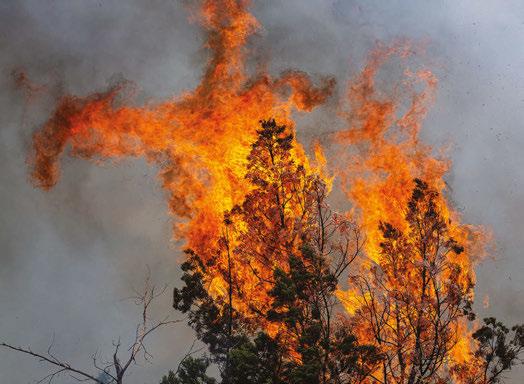
4 minute read
Noble News
from the Noble Research Institute
Where to find technical guidance for land management and conservation
Advertisement
By Steven Smith Noble Research Institute wildlife and fisheries consultant
f you are a land manager, you probably have encountered issues for which you need more advice than a Google search or a YouTube video can provide. Fortunately, land managers have access to several different nongovernment organizations as well as state and federal entities to assist them in solving issues from erosion to brush management.
These entities offer a wide range of services, such as consultation both on-site through property visits and off-site through office, email, text and phone visits; cost-share programs for land management practices; educational materials and programs; and temporary use of equipment. This article gives a brief summary of eight entities that provide technical guidance to land managers focused on natural resources.
NOBLE RESEARCH INSTITUTE
Noble Research Institute exists to help land managers, with a focus on soil, forage, range and cattle stewardship. We also work with pecans and other crops, wildlife and more. Even though we are based in Ardmore, Oklahoma, we have national reach, especially involving offsite consultation, research, publications and educational programs. We offer multi-disciplinary, integrated onsite and offsite consultation to land managers by providing them with non-biased recommendations to achieve their specific goals. Our mission is to deliver solutions to great agricultural challenges. For more information about us, visit www.noble.org.
NATURAL RESOURCES CONSERVATION SERVICE
As the Natural Resources Conservation Service website states, “NRCS conservationists provide technical expertise and conservation planning for farmers, ranchers and forest landowners wanting to make conservation improvements to their land.” NRCS is a federal agency with field offices in most counties across the United States. NRCS offers onsite and offsite consultation, educational materials and programs to land managers. They also offer cost-share programs for land management practices such as brush management, fence construction, water development, etc. For more information about NRCS, visit www.nrcs.usda.gov.
STATE WILDLIFE/NATURAL RESOURCE DEPARTMENTS
Every state has an entity focused on wildlife and fisheries management. Depending on the state, onsite and offsite consultation, cost-share programs for land management practices, educational materials and programs are available. Oklahoma has biologists who assist land managers. Some examples of assistance offered by these departments include deer management and the Oklahoma Farm Pond Management programs. These departments partner with other entities such as Noble, NRCS, and state extension for educational programs.
U.S. FISH AND WILDLIFE SERVICE PARTNERS FOR FISH AND WILDLIFE PROGRAM
According to the website of the U.S. Fish and Wildlife Services, “The Partners Program provides technical and financial assistance to private landowners and Tribes who are willing to work with us and other partners on a voluntary basis to help meet the habitat needs of our Federal Trust Species.” USFWS is a federal agency with regional offices in each state across the United States. USFWS offers onsite and offsite consultation, educational materials and programs to land managers as well as cost-share programs for land management practices such as wetland development, habitat restoration, etc. For more information about USFWS and the Partner Program, visit fws.gov/partners.
PRESCRIBED BURN ASSOCIATIONS
Numerous states are fortunate to have prescribed burn associations. An example of a state burn association is the Oklahoma Prescribed Burn Association. The OPBA is an incorporated nonprofit, created to support local burn associations and develop new ones across Oklahoma. OPBA’s goals are to increase landowners’ capacity to do neighbor-to-neighbor prescribed burns to reduce fuel loads and improve wildlife habitat, while increasing grassland production and enhancing public health and safety of all Oklahomans. Its goal is to provide Oklahoma landowners with access to support, training and equipment to safely implement prescribed fire on their lands. OPBA provides onsite consultation to help plan and implement prescribed burns. Many burn associations offer educational materials and programs and temporary use of equipment for association members. For more information about OPBA, visit ok-pba.org.
STATE COOPERATIVE EXTENSION SERVICE
A Cooperative Extension Service in each state is charged with helping rural communities with resource management and other issues, with offices housed in courthouses, post offices or federal buildings in every county. Extension personnel develop and deliver educational materials and programs, which are typically based on research in the respective state. Most offices offer offsite consultation, with some also able to provide offsite consultation.

QUAIL FOREVER
The Quail Forever website states, “Quail Forever’s Farm Bill Biologist program is designed to educate farmers and landowners about the benefits of conservation programs, as well as assist those landowners after programs have been implemented. We call it the ‘One Stop Shop’ for anything conservation and wildlife-related.” Quail Forever partners with the NRCS, state wildlife departments and other entities to assist land managers improve habitat in the name of upland grassland game birds. Quail Forever offers onsite and offsite consultation as well as educational materials and programs. To find a biologist in your area, visit quailforever.org.

